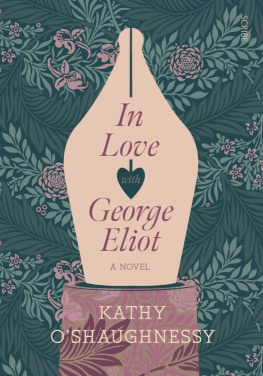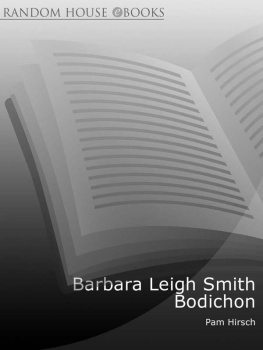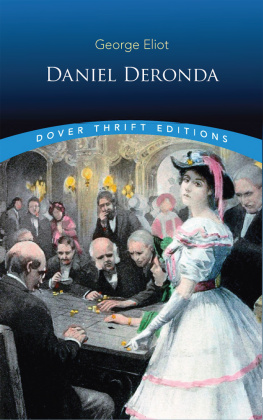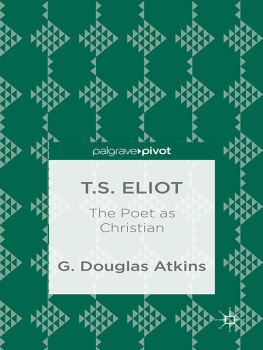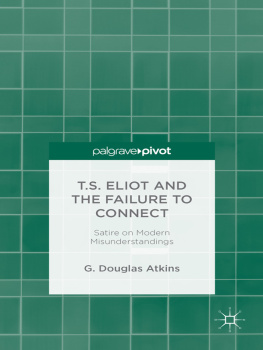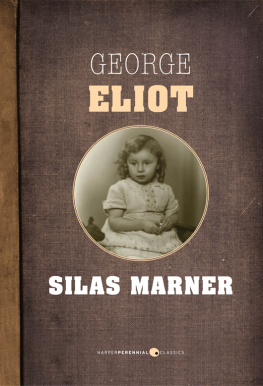
Contents
In Love with George Eliot
Kathy OShaughnessy has reviewed books for The Guardian , The Telegraph , The Times , Financial Times , Independent , The Observer , TLS , New Statesman , The Spectator , and others. She has worked as Deputy Editor on the Literary Review , Arts & Books Editor of Vogue , Literary Editor of The European , and Deputy Editor of The Telegraph Arts & Books. Her stories have been published in Fabers First Fictions, and she edited and introduced Drago Stambuks poems, Incompatible Animals .
Scribe Publications
1820 Edward St, Brunswick, Victoria 3056, Australia
2 John St, Clerkenwell, London, WC1N 2ES, United Kingdom
Published by Scribe in 2019
Copyright Kathy OShaughnessy 2019
All rights reserved. Without limiting the rights under copyright reserved above, no part of this publication may be reproduced, stored in or introduced into a retrieval system, or transmitted, in any form or by any means (electronic, mechanical, photocopying, recording or otherwise) without the prior written permission of the publishers of this book.
The moral rights of the author have been asserted.
9781925849103 (Australian edition)
9781912854042 (UK edition)
9781925693843 (e-book)
Catalogue records for this book are available from the National Library of Australia and the British Library.
scribepublications.com.au
scribepublications.co.uk
For William,
Patrick, Tom, and Beatrice
What shall I be without my Father? It will seem as if a part of my moral nature were gone. I had a horrid vision of myself last night becoming earthly sensual and devilish for want of that purifying restraining influence.
Marian Evans, Letters , 1, 284
I say, Philo! how is it that most peoples lives somehow dont seem to come to much?
Edith Simcox, Episodes in the Lives of Men, Women and Lovers
Prologue
The train had shuddered to a halt. Clatter of doors opening and shutting, noise echoing in the huge vault of Euston station, a smell of oil-flavoured steam and soot. A last door opens, and a woman neither young nor old, slightly round-shouldered, descends to the platform. She looks round, possibly she is short-sighted; a tall man walks towards her. Everything about his stride and the way he greets her suggests a contrasting certainty and vigour.
A minute later, they are in a hansom. I have looked forward to this, says John Chapman, as it jolts along. With you at my side, it will be the best of its kind.
The pale and plain-faced woman, whos been looking down as if preoccupied, while her left hand surreptitiously sets her collar straight, murmurs, Kind of you to say so.
He gives easy voice to his emotion, she thinks, in the way of the beautiful. Another country. But still the proximity to him they are sitting opposite each other, and the cab is so small their knees are practically touching. And she is aware, each time she encounters his glance, of him looking at her, with the keenest interest. Yes, this is why we live, she thinks, with a sort of joyous sigh, an inner trembling and sensation of release. Suddenly she is smiling, as she sees the sights, hears the cries, the thundering rattle of wheels, the indescribably varied din of the city. Then they are turning in to the Strand, where the newspapers have their offices, lit all night. This is the path, she knows, from the City to the nexus of power, Parliament. They draw to a halt at No. 142.
The year is 1851, the day is January 8. London is the capital of the empire, a centre not just of power, but of ideas: education, womens rights, positivism, atheism, evolution, workhouses, prostitution, to name a few.
Marian Evans is shown to her room, down a long corridor, overlooking the Thames. The window is small; the room is small too. In the diminutive grate is a fire, giving little heat. Sitting on the bed, the excitement of the journey is fading, her naturally depressive tendency is asserting itself. So, this is the beginning. She is come from Coventry to make her way in London. John Chapman is hoping to be the next publisher and editor of the Westminster Review , but he has not bought it yet. She will help him, but her exact role is unclear.
Marians spirits revive later in the day when tea is taken in the drawing room. She has washed her hands and face, tidied her hair. Her reflection one look is enough.
She is seated, as the newcomer, nearest to the fire. Its a biting cold January afternoon, already dark outside. The oil and gas lamps have been lit, and on sideboards and small tables there are more lamps than she would have thought possible in one room. Mrs Chapman is fourteen years older than Mr Chapman, and it is rumoured that he married her for her money; there are rumours, too, that she might help finance the Westminster Review . They have three children. Mrs Chapman says, without even the appearance of sincerity, that shes privileged to have Marian to stay. Thank you maam, replies Marian, her own mood peculiarly restoring as she registers Mrs Chapmans sourness.
The door opens, and Miss Tilley, the governess who also helps with housekeeping, enters the room. She didnt know tea was being taken, she says, as she seats herself. Mrs Chapman doesnt glance in Miss Tilleys direction. Marian is now a spectator. The two women form a contrast. Susanna Chapman has a tiny cap perched on the top of her large chignon. Her face resembles a floury milk-pudding, mouth downturning, and she blinks constantly. Miss Tilley is wearing a snug-fitting bodice, tight-waisted above a flowing maroon skirt. Her front ringlets sit as if glued to her forehead above her small, strangely perfect like a cats nose.
Mrs Chapman [looking straight ahead of her]: Did you speak to Mr Hodgson and Mr Janis?
Miss Tilley [also looking straight ahead of her]: I did.
Mrs Chapman: And Cook?
Miss Tilley: She is clear about supper plans.
Now Chapman speaks. Great heavens my dear Miss Evans, he briskly exits the room, returning with the Westminster Review , which he gives to Marian. It bears the first piece by your hand.
Impossible to suppress the bright wave of pride and pleasure filling her. She is aware of two pairs of female eyes watching her.
It is a long book, surely, Mrs Chapman.
Miss Tilley, regarding her, finally bursts out with: What is it, Miss Evans?
I wrote a review of Mackays book, The Progress of the Intellect .
It is a long book, I am sure.
It is an anti-Christian book? asks the governess.
That would be a simplification, says Marian, in her musical, low, cultivated voice. She hesitates before adding: I tried to argue that if we cannot still learn from earlier ways of thought, our way forward must be the more circumscribed.
Total silence has fallen. Miss Tilley and Mrs Chapman are staring at her.
Quite so, puts in John Chapman, quickly. Miss Evans argues that erudition on its own can be mere sterility.
Not exactly, smiles Marian. (Either he hasnt been listening, or he has the fuzziest of intellects.) I said I think I said there is always a place for erudition and knowledge of the past, but alone they wont suffice. But this is very dry matter for the present company, introducing a note of humility, she bows her head.
Youre right, as ever, Miss Evans Miss Evans here has such remarkable clarity of outlook, and compass I am not fearful, with her support, of failing with the Review . I can say that quite confidently. Eh, Mrs Chapman? Good news, my dear, eh?
Doubtless, said Mrs Chapman, looking ahead of her now, one eyebrow slanting in a wild new direction.
Marian is murmuring about flattery when Miss Tilley gets up from her seat, scarlet-faced, and leaves the room.
Next page
